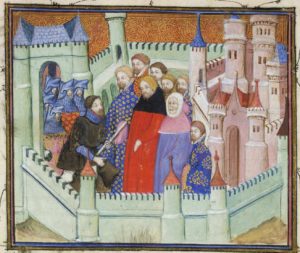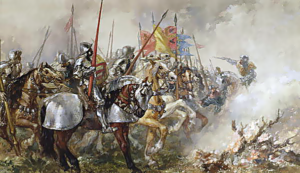
In Part I, Edward Earl of Rutland abandoned King Richard’s cause after the forsaken monarch left his rapidly declining army in South Wales and dashed north to join the Earl of Salisbury in Conwy—where he expected to find another army waiting for him. Richard was too late, for Salisbury couldn’t hold his force together. Frantic, the king sent for Rutland to bring the southern army, only to learn that his cousin had deserted to Bolingbroke. The rest, as they say, is history.
Edward could congratulate himself on joining the winning side. But his trials were far from over. During Henry IV’s first parliament, he was among the six surviving Counter-Appellants brought to task for the murder of the Duke of Gloucester. There was quite a ruckus as lord after lord threw their hoods on the floor and challenged him to a duel until King Henry put a stop to the disturbance. All the Counter- Appellants suffered the loss of their new ranks—awarded by King Richard after the Revenge Parliament—but further retribution was avoided. Henry didn’t want to start his reign with a blood bath. After a brief imprisonment, all were released.
Unfortunately for Henry, their rancor had not diminished as a result of his leniency. Within three months of the coronation, they were plotting to kill the usurper and put Richard back on the throne. Their plan was to infiltrate Windsor castle during the Epiphany tournament, where they would dispatch the king and his family. They might have succeeded except at the last minute, someone told Henry and he fled Windsor just hours before the assassins showed up. Who betrayed the conspirators? No one knows for sure. Some thought an indiscrete accomplice told his mistress who passed it on. But most contemporaries point the finger at Rutland. Did he only pretend to be part of the conspiracy so he could tell the king? Did he change his mind at the last minute and tell his father? Or, as Shakespeare portrayed, did he give himself away by accident, whereas his father forced him to confess to the king? He apparently confirmed his guilt by abandoning his confederates later on, when King Henry showed up with his army. One thing’s for sure: he wasn’t punished. The rest of the rebel leaders were lynched by the mobs, showing their loyalty to the king. Whatever Henry felt about Rutland’s participation has been lost to history.
Though apparently the king trusted him, or at least found him useful. Soon afterwards he was sent to Guyenne as lieutenant for two years. On his return he was made Duke of York, for his father had died in his absence. Then the king made him lieutenant of South Wales, where he worked closely with Prince Henry. But this was certainly not a favor! The exchequer was out of funds and Rutland had to dig deep into his pockets to pay his men (he was still owed money from Guyenne). This could well have stretched his loyalty to King Henry.
In February, 1405, his sister Constance abducted the two Mortimer boys, kept hostage at Windsor Castle; the eldest was considered by many the true heir to the throne and kept in close confinement. Since she was apprehended taking them to Wales, there was no doubt that she was planning to deliver them to Owain Glyndwr (and their uncle Sir Edmund Mortimer, who had joined the rebellion). Constance immediately implicated Rutland, who initially denied any knowledge of her plot, but later he confessed and was imprisoned for seventeen weeks at Pevensey Castle. By October the king showed signs of forgiveness and two months later Rutland received his lands back. A year later he was made Constable of the Tower, landing on his feet again!

Apparently the Prince favored Rutland as well, for after Henry IV’s death he was involved in diplomatic matters for the new king. He accompanied Henry V to Agincourt in 1415, where he was killed on the battlefield.
One can only assume he was a man of considerable ability, which would help explain why he was given so many positions of responsibility despite his dubious reputation among his contemporaries. As an aside, Rutland was an authority on hunting and made an English translation of Gaston Phoebus’ Livre de Chasse, with the addition of several chapters he wrote, himself.